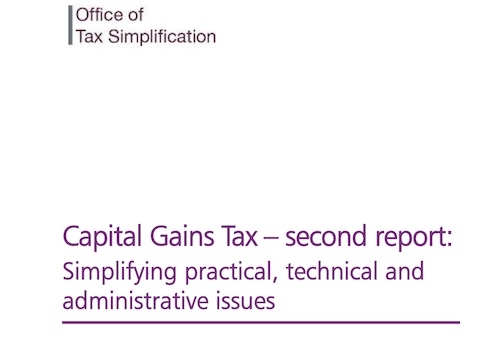The Office of Tax Simplification has called for significant reform of Capital Gains Tax to make it more flexible and reporting of gains easier but has stopped short of radical measures.
The OTS was asked to look into CGT by the Chancellor last year sparking concerns that CGT would be extended or increased.
The government's revenue from CGT has been rising rapidly in recent years. In the 2018-19 tax year, total Capital Gains Tax revenue was £9.5bn from 276,000 CGT taxpayers. In 2018-19, 40% of CGT came from those who made gains of £5m or more. This group forms less than 1% of CGT taxpayers each year.
The OTS report, the second of two from the OTS on CGT, makes 14 recommendations , most of them designed to make it easier for the hundreds of thousands of tax payers who need to report a capital gain each year to do so.
Some of the key changes suggested include:
• Integrating Capital Gains Tax into the Single Customer Account to make it easier to report a capital gain - reducing the need for people to complete a full Self Assessment just to report a capital gain
• UK Property tax return - extending the reporting deadline for the UK Property Tax Return from 30 days to 60 days
• Private Residence Relief nominations - enabling 1.4m second home owners to report gains through the Single Customer Account
• Divorce and Separation - updating the rules for married couples or civil partners transferring assets and extending the period for inter-spouse exempt transfers
• Treatment of deferred proceeds when a business is sold - considering making CGT payable when cash is received
The proceeds from the sale of a business or land can be currently be received in different ways. Sometimes the proceeds of a sale might be paid over a number of years, or the proceeds could be a combination of cash and other assets such as shares. In addition, a business can be sold for an uncertain price that depends on future events or revenue.
The OTS says some of the existing CGT rules are complex and difficult to understand for taxpayers.
Bill Dodwell, OTS Tax Director said: “Together these two reports make up the most comprehensive review ever conducted of the tax and the practical experience of those who report or pay it.
“Many people have limited awareness or understanding of Capital Gains Tax. As the tax tends to affect taxpayers on a one-off basis (over 70% of those paying it in the eleven tax years to 2017-18 did so only once in that period), they do not so readily pick up the knowledge and experience that comes from dealing with something regularly. This means it is particularly important that the rules, and HMRC’s guidance and processes, are intuitive and fit with the practicalities of life, so far as possible.”
Kay Ingram, public policy director of national Financial Planner LEBC, welcomed proposals to give divorcing couples more time to settle their financial affairs when splitting, before they become liable to pay capital gains tax.
She said: “The OTS proposal to extend the period over which married couples and civil partners can transfer assets between each other without paying capital gains tax for up to two years after the tax year of separation is welcome.
“However, many couples separating do not realise that separation will affect their eligibility for a number of tax concessions, CGT being just one. Exemptions from inheritance tax, and eligibility for marriage allowance and some state and private pension benefits are also lost on divorce. With the law about to speed up the divorce process to six months from start to finish, couples need to address the financial split ahead of the legal process starting or they could be facing unexpected tax bills, loss of pension benefits and inheritance rights.”

